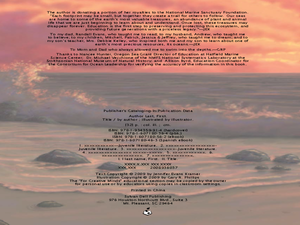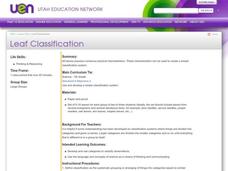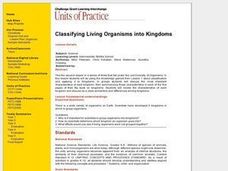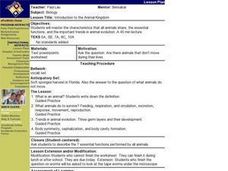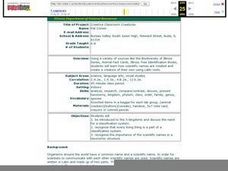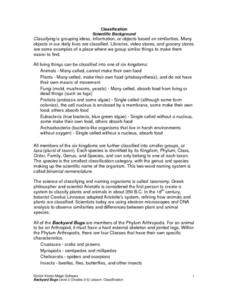Curated OER
Classification of Intertidal Organisma
Students categorize animals. In this animal classification lesson, students group animals by their characteristics. Students break into groups and work together to classify the animals. Students fill out a graphic organizer with their...
Curated OER
World Animal Day
In this World Animal Day worksheet, students complete activities such as reading a passage, phrase matching, fill in the blanks, correct words, multiple choice, spelling, sequencing, scrambled sentences, writing questions, survey, and...
Curated OER
Tic Tac Know Kingdoms
In this PowerPoint, students participate in a variation of tic tac toe in which questions about the animal and plant kingdom are presented and students move to various locations on the game board.
Curated OER
Animal Diversity
Students explore biology by completing science worksheets in class. In this animal anatomy lesson, students read the book The Adventures of Marco and Polo and identify the animals mentioned in it. Students examine a real life animal and...
Curated OER
Animal Hide and Seek
Students read about animal camouflage. In this animal adaptation lesson, students read short texts about ways in which animals hide or transform to escape their prey. Students explore animal classifications and determine ways to hide in...
Curated OER
Creating a Classification System
Students create classification system for Arctic-dwelling animals, the Arctic hare in particular.
Curated OER
Leaf Classification
Seventh graders work together to develop a leaf classification system. In groups, they are given a set of leaves and sort them based on their characteristics. They share their new classification system with the class and answer any...
Curated OER
School Yard Park/ Ecosystem
Fifth graders examine ecosystems in their schoolyard. In this nature and ecosystem lesson, 5th graders map their schoolyard into workable plots. They classify plants and animals found in the plot. They revisit their site every two weeks...
Curated OER
Classifying Living Organisms into Kingdoms
Pupils create a flip book that describes the basic characteristics of the five main animal kingdoms. They research the animal kingdoms, include examples of organisms for each kingdom and illustrate the finished text.
Curated OER
Can You Find...on the "Progression of Life" Poster?
Students examine and analyze a poster that presents various types of animals throughout the ages. They determine biological classification with fossils and earth history in a game.
Curated OER
Animal Classifications
While short, this resource could be used as an overview of amphibians. The presentation lists the characteristics of amphibians and provides several examples. For use in a classroom, a teacher could add information.
Curated OER
Animal Trading Cards
Students use a computer program to research an animal and practice taking notes. In this animal research lesson, students use PebbleGo database to research their animal and take notes. Students then make an animal trading card using...
Curated OER
Introduction to the Animal Kingdom
Students are asked: Are there animals that don't move during their lives. They are asked what is an animal? Students discuss what animals need to survive. They are taught the trends in animal evolution. Students discuss the three...
Curated OER
How Are Animals Grouped?
In this animal grouping activity, students compare and contrast the characteristics of mammals, birds, and fish. This activity has 9 fill in the blank questions in a graphic organizer.
Curated OER
Marshland Ecosystem
Students classify animals based on their physical characteristics and eating habits. In this animal identification lesson plan, students investigate the life forms shown on a Parisian ceramic basin, and discover ecosystem the artist was...
Curated OER
Everything in Its Place: Science Classification
Students investigate the system of classification for living things through the sixteen lessons of this unit. The five kingdoms of monerans, protists, fungi, plants, and animals form the basis of several experiments as the similarities...
Curated OER
Sharks Taxonomy
Young scholars, in groups, establish a classification system for the world of your classroom. They draw a chart to explain their categories and system to the rest of the class.
Curated OER
Academic Raceway: Animals
This animals PowerPoint provides a race car game in which students answer a variety of questions about animals, the majority of which are based on ways in which animals adapt to their surroundings and behave to survive.
Curated OER
Species Charades
Students identify endangered species. In this endangered species lesson plan, the teacher leads a discussion about endangered species, then the class plays a game of charades to pantomime animal behavior.
Curated OER
Creative Classroom Creatures
Young scholars are introduced to the five kingdoms and discover why there is a need for a classification system. Using the internet, they examine how scientific names are created and practice putting animals into their correct...
Curated OER
Invertebrate Phyla
Young scholars explore the invertebrate phyla. They discuss the characteristics of the invertebrate Phyla in the Kingdom Animal. Students classify organisms into Phyla based on their characteristics. They distinguish radial symmetry,...
Curated OER
Backyard Bugs
Explore the concept of scientific classification and the similarities and differences between plant and animal species. Your class will participate in hands-on activities by investigating dichotomous keys and classifying their shoes. To...
New South Wales Department of Education
Invertebrates
Of all invertebrates, insects by far are the most numerous. Scholars discuss invertebrates and then use a key to classify them. They see different examples and must describe features of each organism based upon the key.
Curated OER
Classification 2
Students discuss what makes a living thing (for example, cellular respiration) and collect a selection of living things from outside. They divide their organisms into plants and animals and create a key for the divisions.






